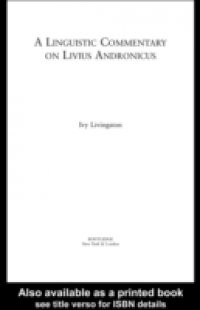Virtually all recent major work on Livius Andronicus has focused on assessing his artistic merits and his skills as a translator of Homer. But, as the oldest literary Latin preserved in any quantity, the language of Livius shows many features of linguistic interest and raises intriguing questions of phonolgy, morphology and syntax. In this book, Ivy Livingston frames an examination of Livius' Latin in the form of a commentary. Although Livius provides the starting-point of each comment, his language is sufficiently similar to his nearest successors - such as Naevius or Ennius - that many of the discussions do not also end with Livius, but explore wider-ranging problems of Latin and of Indo-European linguistics.

